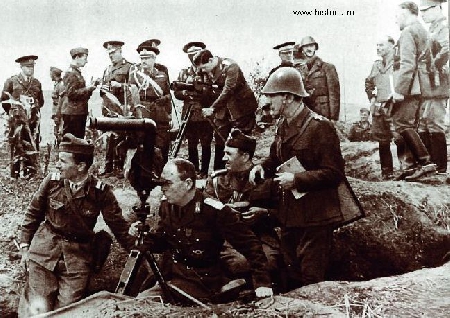The Romanian Army on the Eastern Front
Romania entered World War II on the side of Germany in 1941 at a time when efforts to maintain peace in Europe turned out to be to no avail

Steliu Lambru, 12.08.2013, 12:04
On June 22nd 1941, the Romanian army alongside the Germans crossed the Prut River to liberate Bessarabia, a Romanian province the Soviet Union had annexed a year earlier. At that point the winners of World War I found themselves in a desperate situation. France had been occupied in June 1940, while, within the confines of its own archipelago, England found it very difficult to protect itself from Luftwaffe’s rage. Romania, punished by Hitler for its pro-French and pro-English policy, had no other choice than to adopt Europe’s new German order and substantially contributed to the war effort.
The Romanian army started its offensive against the Soviet army on a battlefront stretching from the Black Sea to Bukovina’s Carpathians. In the wake of the poor Soviet poor resistance, in three weeks alone, the Romanian troops completely liberated the two provinces Bessarabia and Northern Bukovina. On July 27th, Hitler sent Marshall Antonescu a telegram congratulating him on the liberation of the Romanian territories and also asked him to cross the Dniester River in order to occupy the Transdniester region. Alongside the German army, the Romanian contingents continued their anti-Soviet offensive via southern Ukraine and eventually reached Stalingrad.
In 1993, sublieutenant Ahile Sari told Radio Romania’s Center for Oral History that as they were crossing the southern part of the Soviet Union he came across unbelievable situations and things.
Ahile Sari:” For the first time in my life I got to see a train loaded with Soviet deportees, they were not prisoners but deported families, they were probably being sent to Germany. It was also the first time that I experienced that kind of life and the dramatic situation of those starving people with agonized faces, who were holding out their tin cans begging for food. It was a sad image for me, and all of us, soldiers and officers alike, hurried to give them everything that we could through the barbed wire fences, while the watch dogs guarding the railcars were fiercely barking.”
The disaster that ensued for the Romanian army on the Eastern front would begin in Stalingrad. The Soviet Army’s Uranus operation focused on attacking the northern flank of the German army lineup in Stalingrad. Defending it were the Romanian and Hungarian troops, whose equipment was poorer than the Germans’, and who also had a low morale. Benefiting from the massive support of armored vehicles, the Soviet attack on November 19 was ferocious. But the Romanians had already gathered intelligence on that and asked for help from the Germans, but the help never came.
Sublieutenant Ahile Sari recollects an episode from the days preceding the Soviet attack: ”A Russian prisoner was brought to the bunker of a battalion commander, and he told us that the great Soviet offensive was going to start in a day or two, so we’d better be careful and take measures. We’re armed to the teeth, the Russian said, with very many war machines. We reported that to the higher echelons, but nobody wanted to believe that after a month or two of fighting, something could happen in the depth of winter. That was on November 17. On November 19, 1942, at 4 a. m. the great Don and Stalingrad offensive started.”
At the Don River bend the Romanian army lost over 300 thousand soldiers. In 1998 notary Mircea Munteanu recollected his participation in the war. He was wounded, he had to withdraw and get medical care in extremely tough conditions. His confession confirms the idea that even if wounded and, theoretically, out of danger, sufferings would not end.
Mircea Munteanu: “The attack started on November 29th on the banks of the Don River and a bullet penetrated my left clavicle, right near the shoulder blade. After I was wounded, I withdrew with the Germans on a German tank. There I met two majors who saw me on that tank and asked me to get off and talk to them. I told them that the commander of the platoon had been killed by a Russian bayonet. They started patching up my wound. Then we got to a kolkhoz, named Frunza (leaf). I found a sergeant there who gave me a loaf of bread and a can, and told me to go to another village, where there were about 16 wagons from the 16th Infantry Regiment. I went there and I found the wagons, but my shoulder hurt, because I had got there on horseback across the field, which was covered in snow. It was terribly cold and my wound was bleeding, as the patch had fallen. I didn’t have a compass or anything, I would find my way guided by the moon, without being able to see anything else. After I walked for a while I saw a village. A Romanian sentinel was there and I asked whether I could find someone to bandage my wound. He told me they had a veterinarian there. So I left again, with other wounded people, 30 kms to the back of the front line. There they had a camp bath and a hospital, and the Germans had our clothes sterilized and dried, as they were full of blood. Then a train came, we all got on, in wagons lined with blankets and they took us all to Poland.”
Considered by military historians as the bloodiest battle in history, the battle of Stalingrad was actually the one that changed the fate on the eastern front. But this is what we know now. People back than were still hoping that history would turn around, as history is never fully predictable.






























